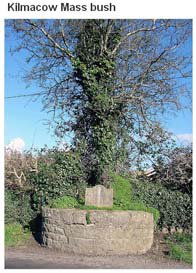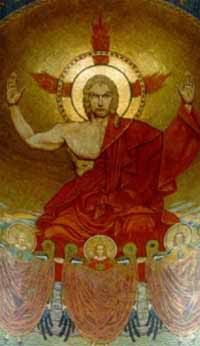Losing our churchs to the lawyers will be hard, but nothing compared to 150 years ago (I hope)

How lightly we respect the great Catholic heritage we enjoy, standing on the blood and courage of those before us.
A mere 150 years ago were such brutal times. It gives "prevailing" a keen meaning.
pictures here...
This site in Kilmacow village, was used for saying mass during penal days.
Mass used to be said at good vantage points, where there was a good lookout. Catholics used to gather for the mass around this stone, when most of the Catholic churches were burned down to the ground.
story here...
By 1778 Irish Catholics would own a meager 5% of Irish land. Furthermore, the Catholic educational system was outlawed and priests who did not conform to the laws could be branded on the face or castrated.
As a result, much of Catholic church services and education and record keeping was forced underground, to operate only under extreme secrecy. The religion and culture were kept alive by secret open-air masses and illegal outdoor schools, known as 'hedge' schools. All Irish culture, music and education was banned. By the time of the census of 1841 the Irish were impoverished, landless and leaderless by the eve of the famine.
- The Catholic Church forbidden to keep church registers.
- The Irish Catholic was forbidden the exercise of his religion.
- He was forbidden to receive education.
- He was forbidden to enter a profession.
- He was forbidden to hold public office.
- He was forbidden to engage in trade or commerce.
- He was forbidden to live in a corporate town or within five miles thereof.
- He was forbidden to own a horse of greater value than five pounds.
- He was forbidden to own land.
- He was forbidden to lease land.
- He was forbidden to accept a mortgage on land in security for a loan.
- He was forbidden to vote.
- He was forbidden to keep any arms for his protection.
- He was forbidden to hold a life annuity.
- He was forbidden to buy land from a Protestant.
- He was forbidden to receive a gift of land from a Protestant.
- He was forbidden to inherit land from a Protestant.
- He was forbidden to inherit anything from a Protestant.
- He was forbidden to rent any land that was worth more than 30 shillings a year.
- He was forbidden to reap from his land any profit exceeding a third of the rent.
- He could not be guardian to a child.
- He could not, when dying, leave his infant children under Catholic guardianship.
- He could not attend Catholic worship.
- He was compelled by law to attend Protestant worship.
- He could not himself educate his child.
- He could not send his child to a Catholic teacher.
- He could not employ a Catholic teacher to come to his child.
- He could not send his child abroad to receive education.




0 Comments:
Post a Comment
<< Home